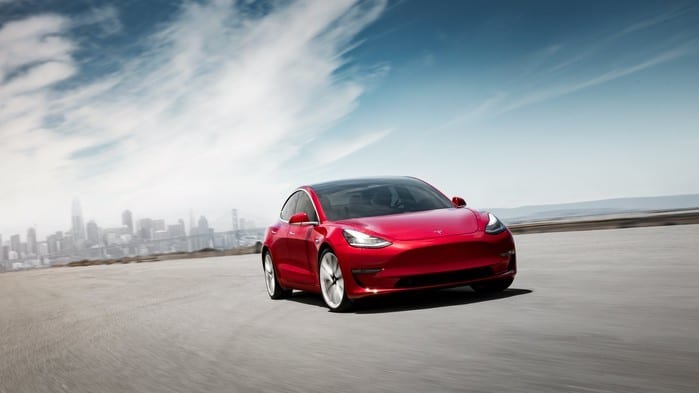This article was originally published on Fool.com. All figures quoted in US dollars unless otherwise stated.
In a recent interview on Motley Fool Live, Motley Fool co-founder and CEO Tom Gardner recalled meeting Kendal Musk – the brother of Tesla (NASDAQ: TSLA) CEO Elon Musk. As Tom recalls, "He looked at me and he said, 'I don't know, I just learned. Don't bet against my brother.'"
Tesla short-sellers are learning that the hard way (again) after Tesla shattered analysts' expectations for the company's third quarter results, which were released on Oct. 21 after market close. Here's what investors need to know.
By the numbers
| Metric | Q3 2020 | Q2 2020 | Q3 2019 | YOY % Change |
|---|---|---|---|---|
| Revenue | $8.8 billion | $6.0 billion | $6.3 billion | 39% |
| Net Income | $331 million | $104 million | $143 million | 131% |
| Adjusted EPS* | $0.76 | $0.44 | $0.37 | 105% |
| Operating Cash Flow | $2.4 billion | $964 million | $756 million | 217% |
| Free Cash Flow | $1.4 billion | $418 million | $371 million | 276% |
*Adjusted Earnings Per Share, diluted (a non-GAAP measure). Data source: Tesla. Chart by author.
Those are impressive numbers, made even more impressive by the fact that they're being posted in the midst of a US recession during which there are fewer drivers on the roads. When 39% revenue growth is the lowest percentage gain in your marquee figures, you know it's at least a good report. For Tesla, the third quarter wasn't just good: it was record-setting.
Quarterly revenue set a new record high for the company, at $8.8 billion, which was expected due to the company's strong delivery numbers. Another record is the $331 million in quarterly net income, which surpassed Tesla's previous milestone of $311 million, set in third quarter 2018. For me, the most jaw-dropping figure is Tesla's $2.4 billion in operating cash flow for the quarter, which is nearly double its previous quarterly record, set in fourth quarter 2017.
Despite the company's outperformance – EPS topped analysts' consensus estimates by $0.20/share – shares closed up less than 1% from the previous day's close. This could indicate that the expectation of big growth is already priced into the lofty valuation of Tesla's stock.
What Musk had to say
CEO Elon Musk, never one to understate his successes, started the earnings call by telling it the way he saw it: "All right. So, Q3 was our best quarter in history."
He highlighted the company's other initiatives, including the incremental advances in battery technology that Tesla showcased at its Battery Day, the beta release of Full Self-Driving mode, the continued buildout of the company's manufacturing capabilities, and a projected increase in sales of Solar Roof, which he referred to as a "killer product".
He also doubled down on the company's stated goal of continuing to cut prices:
If the car is too expensive... and people don't have enough money in their bank account, they simply can't buy it no matter what the value proposition is. So it is important to lower the prices... I do not think we lack for desire for our product, but we do lack for affordability.
The catch-22
Some analysts are concerned that, as the company grows sales of its lower-priced cars and pursues price cuts, it won't be able to maintain its double-digit margin target. CFO Zachary Kirkhorn agreed with Musk on the need for affordability, but didn't think it was mutually exclusive with margin growth:
If you just look at the journey of the company over the last 1.5 years, we have grown volumes and grown gross margins despite a number of price reductions over that period of time, and we have kept OpEx fairly stable during that period of time as well.
We have to also continue to make progress improving the cost structure ... and improve the value of the vehicles at the same time. So in addition to reducing the cost of the car, we're making the cars better. And that's the formula to sell the volume. That's what we're focused on.
One way to do this, according to Musk, is to bring as much manufacturing in-house as possible. "There's in excess of a dozen start-ups effectively in Tesla," Musk said, citing microchips, battery cells, superchargers, and autonomous driving as areas that other car companies outsource but Tesla doesn't. "Tesla is absolutely vertically integrated compared to other auto companies or basically most any company," said Musk. "We literally make the machine.
"Quite frankly, we would like to outsource less," concluded Musk. "That would be great."
What Q3 tells investors
The third quarter's strong performance indicates that Tesla has finally turned the corner when it comes to profitability and cash flow generation from its passenger cars.
Interestingly, Musk and his management team didn't even mention the Semi or Cybertruck until they were specifically asked about them by the analysts on the call. They only briefly mentioned the company's often-overlooked energy storage products, Powerwall and Megacell. The primary focus of the earnings call – and the company – is clearly on its passenger cars.
That's probably good news for investors, since Tesla's cars are in demand and selling well. Focusing on maximising their profitability and improving their affordability is probably going to give Tesla the biggest bang for its buck in terms of improving the (already-much-improved) bottom line.
Tesla's sky-high valuation should give new investors pause, but operationally, it seems to be on solid footing, and its impressive growth streak seems likely to continue. I wouldn't place any bets against the company right now.
This article was originally published on Fool.com. All figures quoted in US dollars unless otherwise stated.









